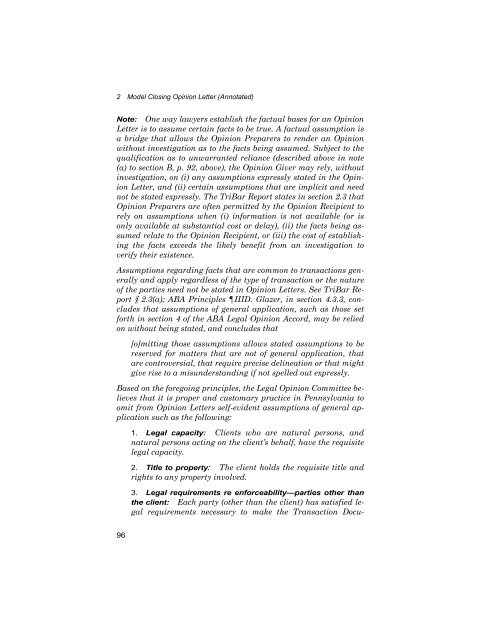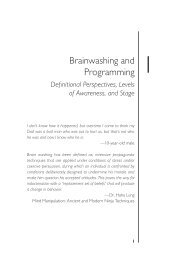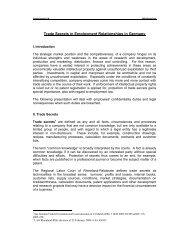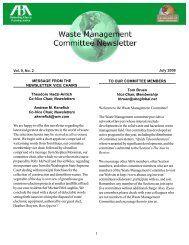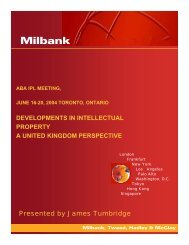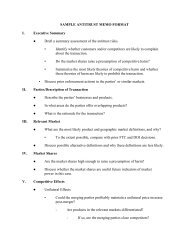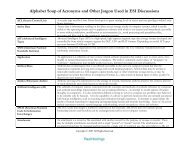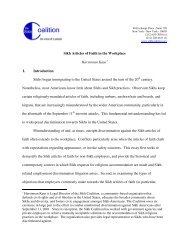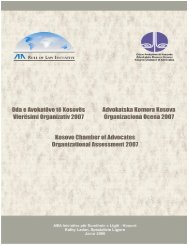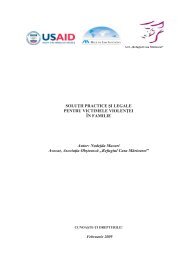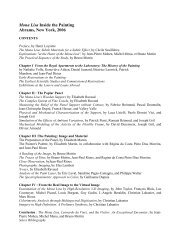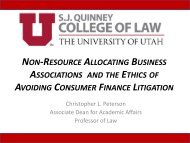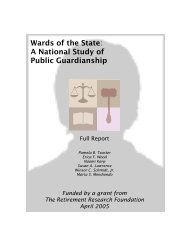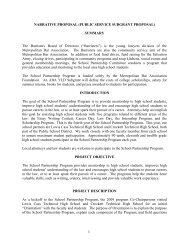Model Closing Opinion Letter (Annotated) - American Bar Association
Model Closing Opinion Letter (Annotated) - American Bar Association
Model Closing Opinion Letter (Annotated) - American Bar Association
Create successful ePaper yourself
Turn your PDF publications into a flip-book with our unique Google optimized e-Paper software.
2 <strong>Model</strong> <strong>Closing</strong> <strong>Opinion</strong> <strong>Letter</strong> (<strong>Annotated</strong>)<br />
Note: One way lawyers establish the factual bases for an <strong>Opinion</strong><br />
<strong>Letter</strong> is to assume certain facts to be true. A factual assumption is<br />
a bridge that allows the <strong>Opinion</strong> Preparers to render an <strong>Opinion</strong><br />
without investigation as to the facts being assumed. Subject to the<br />
qualification as to unwarranted reliance (described above in note<br />
(a) to section B, p. 92, above), the <strong>Opinion</strong> Giver may rely, without<br />
investigation, on (i) any assumptions expressly stated in the <strong>Opinion</strong><br />
<strong>Letter</strong>, and (ii) certain assumptions that are implicit and need<br />
not be stated expressly. The Tri<strong>Bar</strong> Report states in section 2.3 that<br />
<strong>Opinion</strong> Preparers are often permitted by the <strong>Opinion</strong> Recipient to<br />
rely on assumptions when (i) information is not available (or is<br />
only available at substantial cost or delay), (ii) the facts being assumed<br />
relate to the <strong>Opinion</strong> Recipient, or (iii) the cost of establishing<br />
the facts exceeds the likely benefit from an investigation to<br />
verify their existence.<br />
Assumptions regarding facts that are common to transactions generally<br />
and apply regardless of the type of transaction or the nature<br />
of the parties need not be stated in <strong>Opinion</strong> <strong>Letter</strong>s. See Tri<strong>Bar</strong> Report<br />
§ 2.3(a); ABA Principles IIID. Glazer, in section 4.3.3, concludes<br />
that assumptions of general application, such as those set<br />
forth in section 4 of the ABA Legal <strong>Opinion</strong> Accord, may be relied<br />
on without being stated, and concludes that<br />
96<br />
[o]mitting those assumptions allows stated assumptions to be<br />
reserved for matters that are not of general application, that<br />
are controversial, that require precise delineation or that might<br />
give rise to a misunderstanding if not spelled out expressly.<br />
Based on the foregoing principles, the Legal <strong>Opinion</strong> Committee believes<br />
that it is proper and customary practice in Pennsylvania to<br />
omit from <strong>Opinion</strong> <strong>Letter</strong>s self-evident assumptions of general application<br />
such as the following:<br />
1. Legal capacity: Clients who are natural persons, and<br />
natural persons acting on the client’s behalf, have the requisite<br />
legal capacity.<br />
2. Title to property: The client holds the requisite title and<br />
rights to any property involved.<br />
3. Legal requirements re enforceability—parties other than<br />
the client: Each party (other than the client) has satisfied legal<br />
requirements necessary to make the Transaction Docu-


